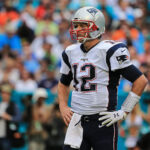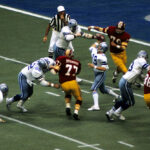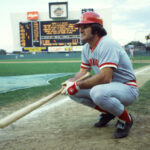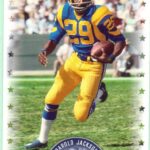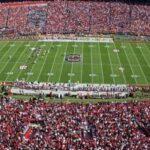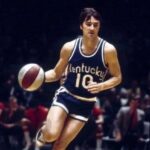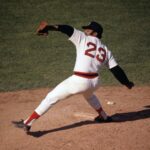Times Have Changed For Rookie Quarterbacks
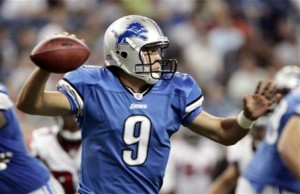
Matt Stafford passed for 205 yards and three interceptions in his debut for the Detroit Lions.
There was a time in the not so distant past when the biggest things a rookie NFL quarterback had to worry about on game day were wearing a cool baseball cap and keeping track of his clipboard.
Current rookies Matt Stafford and Mark Sanchez are just the latest reminder that times have certainly changed, at least for top draft picks.
Instead of carrying clipboards and wearing baseball caps, highly drafted rookie quarterbacks today don’t usually have to wait long before getting a chance to show their stuff.
In the last two seasons, four of the five quarterbacks taken in the first round started the opening game of their rookie season. Only Josh Freeman of Tampa Bay, who was the third quarterback for the Bucs in their 2009 opener against Dallas, wasn’t under center from the beginning of his career.
The Detroit Lions and New York Jets can only hope that Stafford and Sanchez have similar success to what was seen a year ago from rookie quarterbacks Matt Ryan and Joe Flacco.
Ryan, the third pick in the 2008 draft, was an immediate star for the Atlanta Falcons as he led them to the playoffs following a tumultuous 2007 season for the organization.
After going 4-12 in 2007, Ryan led the Falcons to an 11-5 record and a spot in the NFC playoffs. Ryan finished sixth in the league with a passer rating of 98.0 while passing for 3,440 yards and 16 touchdowns with only 11 interceptions. He was honored as the AP Offensive Rookie of the Year.
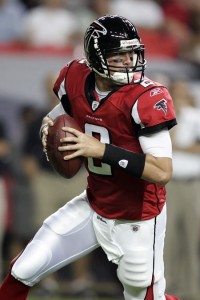
Matt Ryan was the AP Offensive Rookie of the Year after leading the Atlanta Falcons to 11 wins and a playoff spot in 2008.
He doesn’t seem to have missed a beat in 2009 as Ryan tossed two touchdown passes as the Falcons defeated the Miami Dolphins in their season opener.
While Ryan was anointed the starting quarterback from day one in Atlanta, Joe Flacco, who was the 18th pick in the 2008 draft, became the starter based on attrition for the Baltimore Ravens prior to the 2008 season.
The retirement of Steve McNair and injuries to Kyle Boller and Troy Smith gave Flacco the job and he proved to be up to the task.
Though he spent much of his time handing the ball off to the fourth ranked running attack in the NFL, Flacco also proved to be a more than adequate throwing the football.
Starting all 16 games, Flacco earned a passer rating of 80.3 while passing for 2,971 yards and 14 touchdowns with just 12 interceptions.
After going 5-11 in 2007, the Ravens improved to 11-5 in 2008 and reached the AFC Championship Game before losing to the eventual Super Bowl Champion Pittsburgh Steelers.
Flacco appears determined to be known for more than just managing the game in 2009 as he passed for more than 300 yards and three touchdowns in the Ravens’ opening victory over the Chiefs.
While there have always been rookie quarterbacks, especially high draft choices, given the chance to play early in their careers, until very recently it was more common for even highly regarded rookies to have to wait a little while before moving into the starting role.
Since 2000, 26 quarterbacks have been selected in the first round of the NFL Draft. Of those, only six were under center to start the first game of their rookie season, with four of those six coming in the last two years. The other two, David Carr for the Houston Texans in 2002 and Kyle Boller with the Baltimore Ravens in 2003, are no longer with their original teams.
Of the six Hall of Fame quarterbacks who were drafted in the first round of the NFL Draft since 1960 (excluding Jim Kelly and Steve Young who both made their professional debuts in the USFL), only four started the opening game of their first NFL season.
Bob Griese had an excellent debut, completing 63.2% of his passes for 193 yards and two touchdowns in a 35-21 win over the Broncos. Griese went 3-7 as a starter during his rookie season, but was selected to the AFL Pro Bowl.
John Elway started his debut game against the Pittsburgh Steelers, but completed just one of eight passes and was replaced by Steve Deberg. Elway struggled while starting the first five games of his career, but looked much more comfortable later in the year when he started the final five games of the season.
Terry Bradshaw and Troy Aikman both entered the league as the first pick in the NFL Draft and both played for teams that were not very good.
Aikman was 17-35 for 180 yards and two touchdowns in his career opener. But the Dallas Cowboys lost 28-0 to the Saints and Aikman was 0-11 as a starter that season.
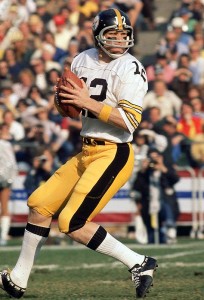
Terry Bradshaw struggled as a rookie, completing only 38 percent of his passes and throwing 24 interceptions.
Bradshaw didn’t fare much better early in his career with the Pittsburgh Steelers. He went 4 for 16 for 70 yards and a touchdown in his debut against Houston before being replaced by Terry Hanratty. Bradshaw started eight games as a rookie, winning three, and completed only 38 percent of his passes with six touchdowns and 24 interceptions.
Money and expectations have always played a role in why some rookie quarterbacks saw very little time as a backup before moving into the starting lineup. With the high salaries most quarterbacks taken in the first round receive, coaches and front offices have much more pressure to see immediate return on that investment than when a quarterback is taken lower in the draft and isn’t receiving such a significant salary.
When Joe Namath signed a $427,000 contract with the New York Jets in 1965, the Jets were not paying for a clipboard holder.
After watching Mike Taliaferro complete four of 21 passes in the season opener, Namath saw action in every game the rest of the season and made nine starts.
Similarly, it didn’t take the Miami Dolphins long to move first round pick Dan Marino into the lineup in 1983.
Marino didn’t play until the third week of the season, but went 7-2 as a starter and set the foundation for his second season when he established a plethora of new passing records and led the Dolphins to the Super Bowl.
But while some top draft choices responded to playing early in their careers with Hall of Fame numbers, others struggled with being immediately thrust into the lineup.
Tim Couch, the first pick in the 1999 NFL Draft ahead of future All-Stars Donovan McNabb and Daunte Culpepper, went 2-12 as a starter for the Browns during his rookie season. In five seasons with Cleveland, Couch was 22-37 as the starter and was out of the game by age 26.
Injuries also can play a key role in whether a young quarterback will have success. Often, high draft picks are playing behind makeshift offensive lines and take a greater pounding than quarterbacks on more successful teams.
Before Joe Flacco did it last year, only three rookie quarterbacks in NFL history had led their team to 2-0 starts. One of them, John Elway, is in the Hall of Fame. The other two, Ryan Leaf and Greg Cook, had only fleeting success before injuries derailed their careers.
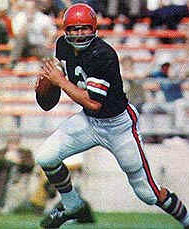
After a promising start, Greg Cook's career was derailed by injuries.
Greg Cook actually led the 1969 Cincinnati Bengals to three straight wins before suffering a torn rotator cuff in his throwing shoulder. After missing three games, Cook came back to play well enough to earn AFL Rookie of the Year honors.
However, a series of surgeries could not repair his shoulder and Cook retired after just one NFL season. He made a brief comeback in 1973, but was unable to return to his previous glory.
Ryan Leaf is best known for tantrums and being considered one of the biggest draft busts in NFL history. However, he did start his NFL career by leading the Chargers to a pair of victories to start the 1998 season.
He ended up going 3-6 as the starter for the Chargers during his rookie campaign and threw 15 interceptions with only two touchdown passes.
Leaf missed the entire 1999 season with a shoulder injury and then in 2000 went 1-8 as a starter and displayed a negative attitude that led to his exit from the NFL following a short stint with the Dallas Cowboys in 2001.
The list of quarterbacks taken in the first round that failed to make it in the NFL is a long and distinguished one that includes names such as Joey Harrington, Akili Smith, Heath Shuler, Rick Mirer, Dan McGwire, Andre Ware, Rich Campbell, Steve Pisarkiewicz, John Reaves, and Terry Baker.
All were believed to have the talent to make it in the NFL, but for whatever reason were unable to fulfill their potential.
It is yet to be seen whether Stafford and Sanchez will enjoy super stardom like Aikman, Elway and Bradshaw or have their names added to the list of NFL quarterback busts. However, it is apparent that they are part of a new era where top rookie quarterbacks will be learning on the field, instead of by holding a clipboard.
